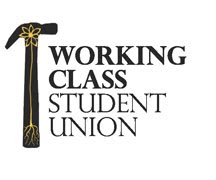When I tell people that I’m interning with the Working Class Student Union, I often get some confused looks. “What do you do?” they often ask me. I give them specifics of my internship responsibilities, but the idea of our organization is still somewhat lost on them. The “short version” I usually give people is “Supporting and advocating for working class, non-traditional, and first-generation college students.” But what does that mean? Why is that necessary? What do we do?
As for the meaning of our quick tagline, it boils down to recognizing that everyone at this university does not come from the same background. Many students come from a variety of different class backgrounds, and that diversity does not need to be kept a secret; it shouldn’t be embarrassing. Working class students are doing an amazing thing by attending this university and creating a better future for themselves and their families, just like students of other social classes and backgrounds.
This support and advocacy are necessary. Statistically speaking, first-generation college students are at a disadvantage coming in to college, and typically receive average or below average grades and have a lower graduation rate than those students whose parents attended college, according to research done by the National Center for Education Statistics. (http://nces.ed.gov/pubsearch/pubsinfo.asp?pubid=2005171) (http://www.insidehighered.com/news/2005/08/10/first) Although students might not admit it, sometimes help is necessary, even if it’s just in the form of someone to talk to that understands their situation or some friendly advice.
On that note, now maybe it’s easier to understand what we do. We offer a support network of working class and first-generation college students and allies. Our members have gone through the complications involved with navigating college, tuition, and coursework, among other things. We want to offer students a safe place to talk, people to come to for help, and friends that understand them.
Our organization coordinates movie nights and discussions, issue meetings and forums, study tables, resources, and, most importantly, reaches out to students to help enhance their own “Wisconsin Experience”. Join us sometime for some of our events, we would love to have you!
The Working Class Student Union is hiring two paid positions for the 2011-2012 fiscal year. Applications for Communications Director and Outreach Director are being accepted through March 25th. Email wcsu.president@gmail.com for more information!



